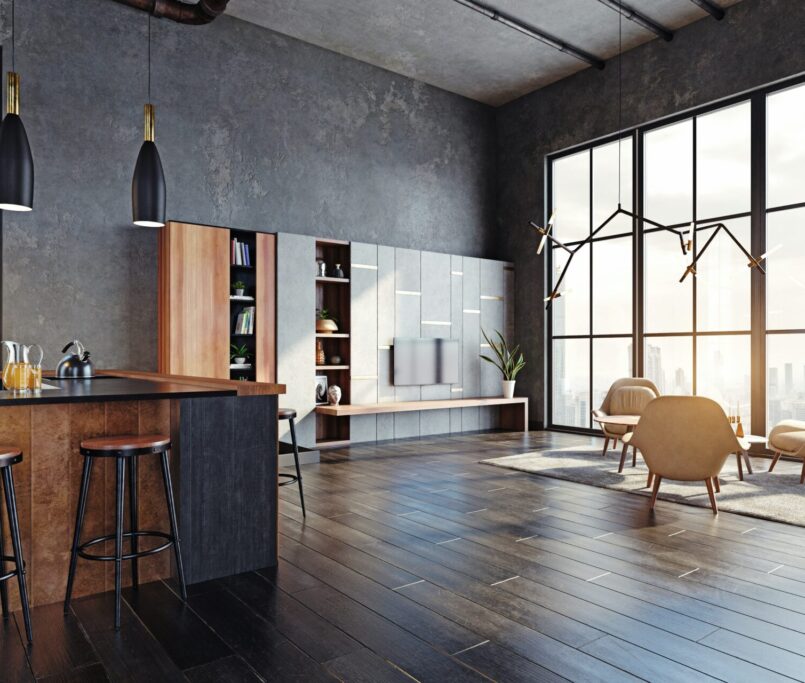Hardwood Floor Installation Cost Guide
When considering new hardwood flooring, it’s important to understand the costs involved. The cost of installing hardwood floors varies significantly depending on several factors, including the type of hardwood flooring, the square footage, and the intricacies of the installation process itself. Whether you’re upgrading your home or replacing water-damaged floors, we’ll break down the essential components that make up the total cost of installing hardwood floors, so you can plan accordingly.
Factors That Affect the Cost of Hardwood Floor Installation
1. Type of Hardwood Flooring
One of the primary factors that affect the cost of installing hardwood floors is the type of hardwood flooring you choose. The price per square foot will vary based on the species of wood and whether you opt for engineered hardwood or solid hardwood.
Engineered hardwood typically costs less than solid wood flooring due to its layered construction. It’s more stable and can be a great option for areas with fluctuating humidity. Depending on the type of wood you select, engineered hardwood can be an affordable yet durable choice for homeowners looking to save money in the long run.
Solid hardwood, such as red oak or maple, tends to cost more than engineered options. Expect to pay anywhere from $6 to $12 per square foot for materials alone for solid hardwood flooring, with higher-end options such as exotic woods pushing costs even further.
2. Wood Species
The species of wood you choose for your floors is another critical determinant in the overall cost. More common wood species, such as red oak, are typically more affordable than exotic woods like teak or Brazilian cherry. These exotic wood species offer stunning aesthetics and unique grain patterns, but they come at a higher price, sometimes exceeding $15 per square foot.
The species you select also impacts the installation process. For example, softer woods like pine are easier to work with and often require less labor. In contrast, harder woods like hickory or maple might take longer to install, increasing the overall cost for labor.
3. Square Footage
Of course, the larger the area you plan to cover with hardwood flooring, the higher the total cost will be. Hardwood flooring costs are typically calculated by square footage, including both materials and labor. Be sure to measure your space accurately and factor in some additional square footage for potential cuts and adjustments during installation.
On average, homeowners can expect to pay between $8 and $12 per square foot for hardwood flooring installation. However, your specific costs will depend on the factors mentioned above, such as wood species, the quality of the flooring material, and any additional requirements for the space.
4. Labor Costs
Labor costs are an integral part of the overall hardwood floor installation cost. On average, you can expect to pay between $3 and $5 per square foot for labor alone, depending on the complexity of the installation. If your floor requires intricate patterns, custom designs, or specific subfloor preparation, the labor costs may be higher.
Some hardwood flooring stores may offer package deals that include both materials and labor, while others may separate the costs. Be sure to inquire about the cost of installing new flooring at your hardwood flooring store and whether labor is included in the price quote.
5. Subfloor Preparation
Installing hardwood floors often requires some level of subfloor preparation. If your existing subfloor is damaged or uneven, additional costs may be incurred for repairs or leveling. If your home has old carpeting, removing the carpet and preparing the floor for hardwood installation is another cost to consider.
When water damage is a factor, the cost of subfloor repairs may increase significantly, depending on the extent of the damage. Subfloor issues often go hand-in-hand with moisture problems, so it’s essential to address any water damage concerns before moving forward with installing new flooring.
6. Location and Accessibility
The location of your home can also impact the cost of hardwood installation. If your home is located in a remote area or if the job requires significant travel for the installers, you may incur extra charges for transportation. In addition, some areas may have higher labor rates due to the local cost of living, so it’s worth discussing these details with your chosen hardwood flooring store.
7. Additional Costs
When installing new flooring, there are a few other potential expenses to keep in mind:
- Finishing Costs: Many hardwood floors need to be sanded and finished after installation, which can cost an additional $1 to $3 per square foot.
- Trim and Molding: Adding baseboards or trim to complement your new hardwood floors is another cost you should factor into your total price. These costs vary depending on the style and material used.
Understanding the Total Cost of Hardwood Flooring Installation
While the price of materials and labor will comprise the bulk of your total cost, the best way to estimate the total cost of hardwood floor installation is by considering the factors mentioned above. Depending on the type of wood, wood species, and labor costs, the price can range from as low as $3 per square foot for engineered wood to more than $15 per square foot for premium exotic wood species with intricate finishes.
The total cost will also vary depending on whether you’re installing hardwood in a new home or replacing old flooring. Older homes with more complex layouts may incur additional labor and material costs, while modern homes with relatively easy access may not have the same level of complication.
In general, homeowners can expect to pay between $6 and $12 per square foot for quality hardwood flooring materials and professional installation. The total cost will increase based on the size of the area, the wood species selected, and any additional services required, such as subfloor repairs or custom designs.
While the initial cost of installing hardwood floors may be higher compared to other flooring materials like carpet or laminate, it’s important to consider the long-term benefits. Hardwood floors not only add value to your home but also provide long-lasting durability. If properly maintained, hardwood flooring can last for decades, making it a smart investment that can save you money in the long run.
When evaluating your hardwood flooring options, it’s important to select the right materials that fit both your budget and lifestyle. Whether you choose engineered hardwood for a more affordable option or opt for solid wood floors for their timeless beauty, it’s essential to work with a trusted hardwood flooring store to ensure the best possible outcome for your project.
Keep in mind that the total cost of installing hardwood floors will vary based on the type of wood, square footage, labor, and any additional services you may require. By understanding these factors, you can make an informed decision and enjoy the many benefits of beautiful, durable hardwood floors in your home for years to come.






